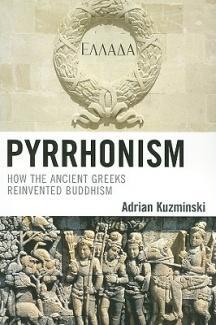Over at 3AM Magazine, Richard Marshall has posted yet another killer interview, this time with Nietzsche scholar Jessica Berry. It’s a nice companion to his interview with Nietzsche scholar Brian Leiter. Though I’ve been reading Nietzsche for decades, this is the first time I’ve encountered him through a Pyrrhonian lens. It’s an apt optic.
In this excerpt, Berry describes this particular form of skepticism and its appeal:
Pyrrhonian skeptics are those who adopt a certain practice with a nod to Pyrrho of Elis, a Greek figure of the mid-fourth to mid-third century BCE, who actually left no writings but with whom the practice is said to have originated. Our best knowledge of this variety of skepticism in fact comes from a second century CE physician named Sextus Empiricus. What makes the Pyrrhonists unique among other sorts of skeptics is that on all speculative, “philosophical” questions, they suspend judgment. This ephectic attitude is in fact the hallmark of Pyrrhonism.
From their point of view, other skeptics turn out to be nothing more than negative dogmatists. And that’s a crucial observation, because it’s what gives the Pyrrhonist his claim to being a real skeptic – a word that originally means “inquirer.” If I’ve suspended judgment on an issue, it makes sense for me to continue investigating.
If, on the hand, I’ve made up my mind that, say, there is no God or that values don’t exist or that knowledge is impossible, then I’ve closed off that avenue of investigation and come to rest with a position I have to defend no less vigorously than my dogmatic opponents.
This is an attitude and practice that clearly resonates in Nietzsche, and which has some obvious relevance to the theist-atheist shouting matches that garner so much attention these days. As Berry also states, this isn’t simply a method or technique without aim — it’s a kind of therapy that engenders equanimity or mental health. While I’ve always been comfortable with the uncertainty that comes with seeing all sides of an argument, it’s not for everyone. Berry recognizes this:
I believe most human beings — in antiquity, in Nietzsche’s era, and today – simply presuppose that uncertainty or lack of knowledge is incompatible with well being, and they exhibit what Nietzsche identifies as the “metaphysical need” to believe just about anything rather than nothing at all. But that’s a pathology, on his account, and on the [Pyrrhonist] Skeptics’ account.
While I think Berry is correct to say that most people have a need for certainty or the absolute, I’m guessing that the minority to which she alludes are Pyrrhonists and their skeptical kin. I have another group in mind: traditional animists.
The hunter-gatherer ethnohistoric record is replete with references to mysteries that are variously characterized as the unknown, strange, surprising, extraordinary, paradoxical, awesome, and serendipitous. The Lakota call it wakan, the Algonquins manitou, the Shoshone paha, and the Crow maxpe. Similar mysteries are known to south African Bushmen as n/um and to people in Oceania as mana. They are deeply woven into the fabric of Aboriginal Dreaming.
Among those who have such ideas, or perceive this way, there is acceptance of uncertainty and equanimity in the face of mystery. The need for certainty and the absolute is, in my estimation, mostly a post-Neolithic (i.e., agricultural-industrial) pathology or modern affliction.
For those who might be thinking (as I was) that some of this sounds a bit Buddhist or even Zen, at least one scholar has already made the connection. While I can’t vouch for Pyrrhonism: How the Ancient Greeks Reinvented Buddhism by Adrian Kuzminski, it looks interesting. I may have to order it along with Jessica Berry’s Nietzsche and The Ancient Skeptical Tradition.



